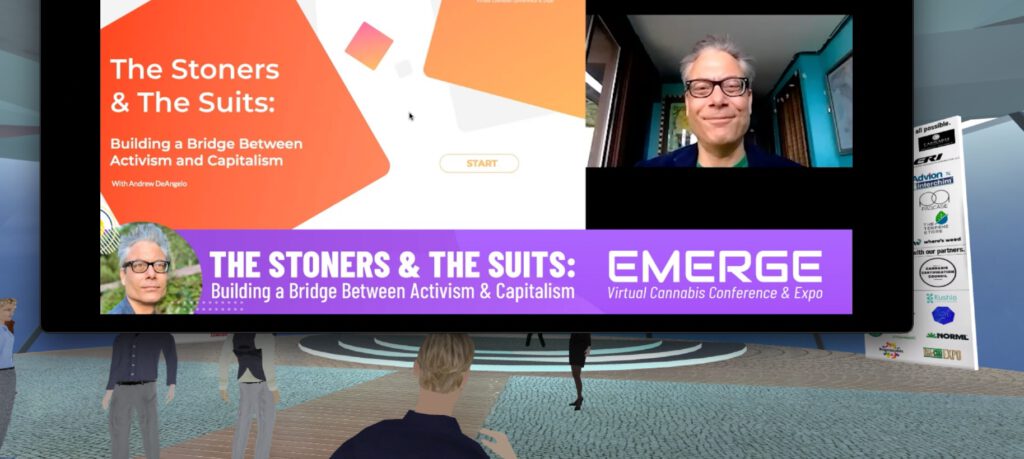Name another business conference where you can network and discuss the benefits of cannabis while observing a family of whales peacefully swimming just overhead.
Day 2 of the Summer Emerge Virtual Cannabis Conference was a success, where attendees got the chance to be inspired by enthusiastic speakers, explore booths, and learn from 15 informative panels conversing about concentrates, compliance, and activism.
Members of the cannabis industry navigated through three floors of the underwater auditorium, performing in dance parties and partaking in exciting giveaways, all from the comfort of their home. It makes perfect sense that many of our panels discussed sustainability, as our Emerge platform lowers the cost and environmental waste of traveling and putting together an in-person business conference. While our Emerge platform was virtual, the impact of creating a sustainable cannabis industry is very real.
Social Equity and Activism within the Cannabis Space

The day started bright and early at 9 a.m. for our friends in the pacific time zone. Cannabis activist and Co-Founder of Harborside Andrew DeAngelo led The Stoners vs. The Suits: Building a Bridge Between Activism & Capitalism panel in Auditorium C. DeAngelo talked about how much our budding industry has changed in just the past twenty years.
“It has taken a huge tribe of human beings to create this much change in such a short amount of time,” remarked DeAngelo.
DeAngelo talks about his time breaking barriers in the industry and how he saw the plant’s potential at a time when legalization seemed like a dream.
His dispensary Harborside was the first licensed cannabis dispensary in the world, and when opening a dialogue about cannabis legalization, he found that the simple act of wearing a suit destigmatized the plant and allowed for stakeholders to really listen to what he had to say.
While a lot of progress has been made in terms of accessible access to plant medicine, there is still a lot that needs to be done when it comes to social equity.
Everyone who had the chance to attend Emerge has benefited in some way from the cannabis plant, and we all have the privilege to spend three days talking about it.
The Last Prisoner Project hosted the panel Change is Coming: An Update from Last Prisoner Project to discuss what steps are being taken to provide relief and fight for those wrongfully incarcerated for nonviolent cannabis crimes.
Natalie Papillion, Director of Strategic Initiatives for the Last Prisoner Project, talked about their latest initiative, Cannabis Clemency, which calls on President Biden to make serious strides to provide immediate relief by granting clemency to the thousands who have had their lives ruined by federal cannabis-related convictions.
Papillion called for those in the industry to stand up and educate themselves, reach out to their elected officials, and let their voices be heard in the fight for cannabis justice reform.
Building a Transparent Industry

As COVID-19-restrictions are beginning to ease and more people are returning to a life of pre-pandemic normalcy, our next focus is to discuss how we will move forward as a more transparent and trustworthy industry.
In Auditorium B, guests had the opportunity to learn how being compliant and strictly following regulations benefits a cannabis business and its employees.
Kim Stuck, who is the Founder and CEO of Allay consulting, talked about how, from a food safety perspective, the cannabis industry is very unregulated and how receiving a GMP (good manufacturing practices) certification, is a great way to show people that you really care about what’s in your products.
“We really need to think about health and safety because when somebody has a recall or somebody gets sick because of a cannabis product, it’s all over the news. It’s going to be a black eye on the industry and it makes us all look bad,” said Stuck.
“So, being cognizant that because you’re a cannabis brand, you’re also representing the industry as a whole. Being at those standards, and getting those certifications like GMP and ISO and Organic, is really great because it just makes us look even better. We have to represent in that way.”
Stuck emphasizes that while receiving a GMP certification is a lengthy process, it’s a good decision in the long run.
More consumers are educated in the fact that health inspectors aren’t regulating these companies, many are making sure the cannabis companies they are buying their products from have received a GMP certification before purchasing.
Sheri Tarr, founder and chief advisor for ‘68Partners, agreed with Stuck, stating that safety is profit. If you build a safe product, market it and manufacture it in a transparent way, consumers will trust and rely on the safety of your product, and the probability of them returning will be greater.
“It always comes down to this: was this product safe, can I rely on it consistently, was their marketing honest? If yes to all those, then you will never see a courtroom, or a complaining consumer, and your brand will flourish,” said Tarr.
Bright Minds and Fresh Ideas

With the industry flourishing right before our eyes, many eager entrepreneurs are looking to find their footing and think of innovative ways to improve the cannabis landscape. For some cannabis enthusiasts, they’re starting early.
In the Cannabis Normalization: Higher Education Degrees and Opportunities panel, two professors at Colorado State University in Pueblo talked about the prospect of offering cannabis degrees for students.
After taking about a year to approve, the public university now offers a rigorous cannabis biology and chemistry major that has already shown immense interest from students.
“We wanted to make sure this degree was as broad and broadly applicable as possible,” said Dr. David Lehmpuhl, Interim Dean of the College of STEM at CSU-Pueblo
We ended the eventful day by listening to four impressive pitches during our Cannabis Investor Pitch Contest, which resembled a Shark Tank-style roundtable, where four influential cannabis industry influencers gave their insight on the ideas pitched.
The contestants included Surge Automated, Forests Medicinals, Rolling Acre Distribution, and Green Parcel Service. In the end, all of the pitches shared themes of convenience for cannabis consumers, social equity, and a focus on transparent products.
Surge Automated, an automated identity and age verification software whose mission is to eliminate underage transactions, ended up taking first place. In the end, the pitch contest, as well as all the speakers at the event, really emphasized how our industry is filled with trailblazers.
It was hard enough getting this industry started in the first place, but now that we’re here — the ideas, the drive, the initiative to grow and learn is only increasing with time.






